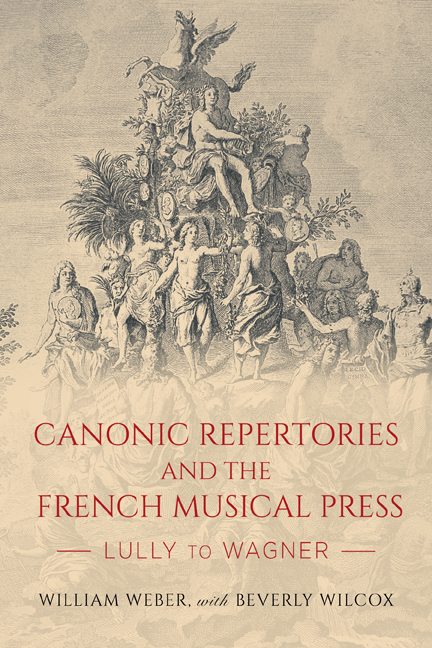Book contents
- Frontmatter
- Contents
- Acknowledgments
- List of Illustrations
- Introduction
- 1 The Domestic versus the Foreign in Eighteenth-Century Paris and London
- 2 Elements of Canon Formation at the Concert Spirituel (Beverly Wilcox)
- 3 To Praise or to Criticize? The Evolution of Music Criticism in Eighteenth-Century France
- 4 Haydn in the Press during the 1780s: How Did a Canon Arise?
- 5 Parallel Canons at the Opéra and the Comédie-Française at the End of the Ancien Régime
- 6 Negotiating Canonic Repertory and les progrès de la musique at the Paris Opéra, 1815–1830
- 7 The Evolution of le vieux répertoire at the Opéra-Comique in the Nineteenth Century
- 8 Richard Wagner, Concert Life, and Musical Canon in Paris, 1860–1914
- An Afterword
- Bibliography
- Index
4 - Haydn in the Press during the 1780s: How Did a Canon Arise?
Published online by Cambridge University Press: 26 May 2022
- Frontmatter
- Contents
- Acknowledgments
- List of Illustrations
- Introduction
- 1 The Domestic versus the Foreign in Eighteenth-Century Paris and London
- 2 Elements of Canon Formation at the Concert Spirituel (Beverly Wilcox)
- 3 To Praise or to Criticize? The Evolution of Music Criticism in Eighteenth-Century France
- 4 Haydn in the Press during the 1780s: How Did a Canon Arise?
- 5 Parallel Canons at the Opéra and the Comédie-Française at the End of the Ancien Régime
- 6 Negotiating Canonic Repertory and les progrès de la musique at the Paris Opéra, 1815–1830
- 7 The Evolution of le vieux répertoire at the Opéra-Comique in the Nineteenth Century
- 8 Richard Wagner, Concert Life, and Musical Canon in Paris, 1860–1914
- An Afterword
- Bibliography
- Index
Summary
The first context in which Joseph Haydn was honored distinctively in canonic terms came about in Paris in the 1780s, when some of his early symphonies and his setting of the text Stabat mater were performed at the Concert Spirituel to the great admiration of the press and the public. Even though strong support for his music was spreading widely in Austria and the German states, as Wolfgang Fuhrmann has shown, it was events at the inter-nationally prominent Parisian concert series that first established his reputation in Europe as a whole. This was a landmark case of a living composer being honored by the public with what this book has defined as incipient canonicity. The very fact that Haydn was recognized in the highest terms without being on the scene indicates the unusual nature of response by both the public in general and the musically most educated people. This chapter extends the discussion of music criticism initiated in Chapter 3 to contemporary reports about performance of Haydn's music at the Concert Spirituel. Public fascination with his music influenced the director of the concerts to give special attention to his symphonies and to his setting of the Stabat mater (1767) in comparison with that of Giovanni Pergolesi (1736). A quasi-formal debate ensued regarding the merits of the two settings, breaking new ground in critical commentary.
Both the Stabat mater and the early symphonies largely disappeared from performance during the nineteenth century, and Haydn's reputation declined significantly in some contexts. The rising notion of classical music from the 1820s established critical and ideological boundaries between lower- and higher-level taste, making Haydn seem a lesser figure in comparison with the artistic depth seen in pieces by Mozart and Beethoven. Leon Botstein has summed up his view of the situation, arguing that Haydn's music came to seem “innocent, naïve, cheerful, healthy, supremely well-crafted but essentially entertaining and emotionally distant, if not irrelevant.” James Garratt has demurred on this matter, suggesting that, even though some commentators saw Haydn's music as superseded by “the spirit of modernity,” his chamber works and pieces for chorus and orchestra were highly respected among critics and the public. The re-evaluation of Haydn's early symphonies came about with new recordings made in the early 1970s by Antal Dorati with the Philharmonica Hungarica and then in the 1990s by the Orchestra of the Age of Enlightenment under Christopher Hogwood.
- Type
- Chapter
- Information
- Canonic Repertories and the French Musical PressLully to Wagner, pp. 102 - 127Publisher: Boydell & BrewerPrint publication year: 2021

